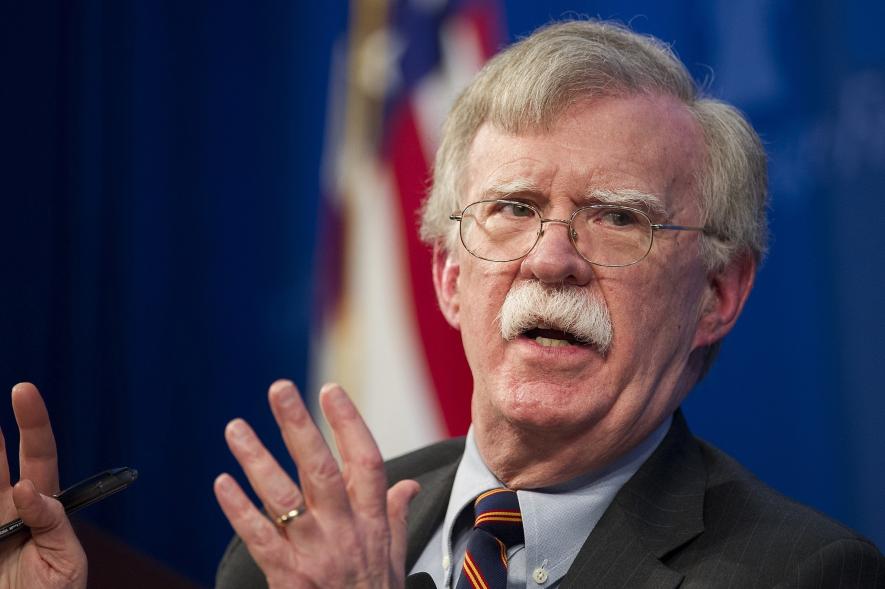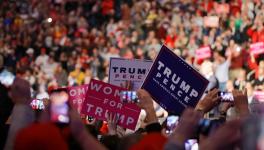Bolton Forewarns Israel on US Policy Shifts

Former US National Security Advisor John Bolton said Israel should act now ahead of US election to strengthen its security interests.
The former US National Security Advisor John Bolton is a paradox in some ways — an extreme right-winger with working class background, an outlier like Richard Nixon who had to run twice as fast to keep pace with the ‘best and the brightest’, and a sharp intellect who is experienced in statecraft, unlike many presidential aides who walked in and out of the White House revolving door since 2017.
Last Monday, the Israeli press reported on an interview by Bolton with Israel’s Army Radio that if any country in the Middle East should have reason to be worried about the outcome of the US presidential election in November, it is Israel. In Bolton’s estimation, despite the general impression that Trump has been exceedingly good for Israel, in reality, Israel may have little to choose between Donald Trump and Joe Biden as the next US president.
As Bolton sees it, Trump’s actions in the Middle East, including the fateful decision to pull out of the 2015 Iran nuclear deal, were not so much ‘pro-Israeli’ moves as steps taken by Trump with an eye on the US domestic audience. In Bolton’s words,
“[Trump] is motivated much more by domestic American politics which is why if it turns out he is reelected in November, we don’t know what he is going to do once he is freed from electoral constraints. Which is why anyone who is concerned about what happens in the Middle East should worry about what happens in a second term.”
The Middle East never really figured as a centerpiece of Candidate Trump’s foreign-policy agenda in the 2016 election, whose main thrust was on the US’s imperial overstretch. Trump disapproved of the 2003 Iraq invasion and underscored that the US should intervene abroad only if its interests came under threat.
Candidate Trump regarded the Middle East as a region of ‘freeloaders’. He thought those ‘freeloaders’ took advantage of the US. Even today, he expects the Saudi regime to bankroll the US military deployments to the kingdom to counter the perceived Iranian security challenge. He has openly bragged that without US security cover, the Saudi regime would pack up within the fortnight.
But when it comes to Israel, he responded generously. Trump was never a votary of Zionism and even had a reputation of sorts for being anti-Semitic, but he took care to project himself as Israel’s very special friend.
Now, Bolton has implied that Trump will have no more need to placate the Jewish lobby once he wins a second term and liberates himself from the myriad political pressures, owing to elections and campaigns and fund-raising.
At this point, when pointedly asked whether Trump’s potential reelection would be a blessing for Israel or put the country in danger, Bolton responded that he didn’t think that either Trump or Democratic challenger Joe Biden would be good for Israel.
That is a startling remark. The point is, if Trump may ‘decouple’ from the Jewish lobby (which in any case is largely supportive of Democrats) or the evangelicals, Biden’s Iran policy might undercut the Israeli regional strategy to contain Iran.
Bolton appears to share the opinion of most analysts that if Biden gets elected to power in the November election, he will return the US to the Joint Comprehensive Plan of Action (JCPOA), which Tehran has demanded as the prerequisite for any form of negotiations with the US.
Indeed, that would mean Iran gets leeway to garner the benefits that it is entitled to so long as it keeps fulfilling the commitments under the JCPOA. Israel has reason to worry that the resuscitation of the JCPOA will inevitably generate a dynamics of its own, opening the pathway for Iran’s integration into the world economy.
Also read: Even If Joe Biden Wins in a Blowout, the ‘Global Economy’ Is Not Coming Back
Bolton comes up at this point with some practical advice to Israel to prepare for the uncertain times ahead. He told Israel’s Army Radio, “I think the next few months are an optimal time for Israel to act in its own national security interests.” Put differently, in the interim period from now, Israel should do what it takes to strengthen its security interests.
Israel may have already begun acting on these lines. There is much speculation that the series of bomb explosions in Iran in the recent weeks in sensitive installations may have an Israeli connection — the July 2 explosion at the Natanz nuclear facility, a huge blast near the Parchin military site and so on. Equally, Israel has resumed its attacks on targets inside Syria. In the latest incident on Friday, Israeli helicopters targeted multiple Syrian observation posts in Quneitra in Southwest Syria.
The Israeli intention could be to provoke Iran and/or Hezbollah to retaliate in some form, which could be seized as casus belli to trigger a conflict.
However, do not also underestimate the Israeli ingenuity to break out of regional isolation. Israel enjoys convergence with many Sunni Arab states. The dealings between Tel Aviv and Abu Dhabi have matured to a point that the opening of an Emirati embassy in Israel is being openly talked about as a possibility.
On June 16, the UAE Minister of State for Foreign Affairs Anwar Gargash called for greater cooperation with Israel despite its annexation plans in the occupied West Bank. Addressing the annual Global Forum of the American Jewish Committee, Gargash said,
“Clearly, looking back at different episodes in Arab history in the context of dealing with Israel, we see that negotiations and having lines of communications open will actually yield better results for us and the Israelis, and at the same time, a policy of rhetoric, a policy of stonewalling, a policy of not actually opening these lines of communications has only radicalised the Israeli-Palestinian conflict.”
Again, given the strong antipathy toward Turkey and the Muslim Brotherhood that Israel shares with the UAE, Saudi Arabia, and Egypt, Israel may extend helping hand to the eastern Libyan warlord Khalifa Haftar at some point (who is also supported by Russia.) Given Turkey’s close links with Hamas, Israel would disrupt any Turkish consolidation in Libya.
Then, there is still the great Middle Eastern puzzle remaining: Will Biden revive the US’s links with the Assad regime in Syria dating back to the era of Henry Kissinger? Bolton’s prognosis should be taken seriously.
Also read: Trump Foreign Policy Enters Lame Duck Period
Get the latest reports & analysis with people's perspective on Protests, movements & deep analytical videos, discussions of the current affairs in your Telegram app. Subscribe to NewsClick's Telegram channel & get Real-Time updates on stories, as they get published on our website.
























